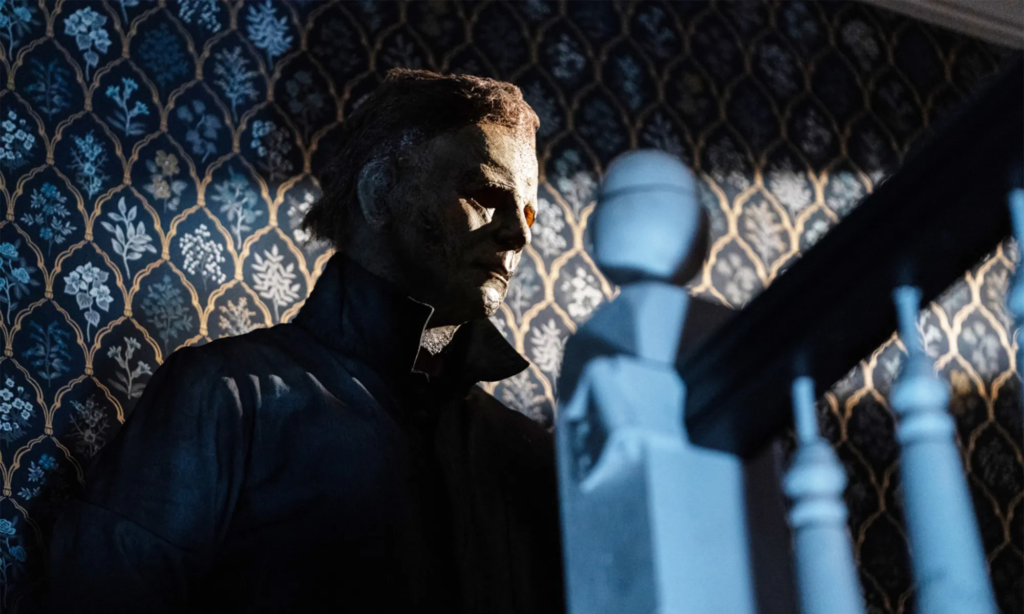
At least it is over now. Halloween Ends, the bitter and senseless finale to director David Gordon Green’s agonizing trilogy of new Halloween movies, wraps up what has been, well, an altogether pointless six-hour return to Haddonfield. The series’ themes are twisted into even more perplexing knots by Green and his four credited screenwriters, among them Danny McBride. What was the true subject of these films?
The first one did indeed deal with trauma. The second one dealt with a kind of public wrath brought on by violent crime. The third movie, Halloween Ends, also addresses these issues and muses on the inevitable presence of evil, perhaps to extract some sort of great insight. Or perhaps the picture is a spoof of self-aware horror movies, with all their awkward allegories and broad clichés. don’t care if Gordon Green is being sarcastic or not, though. Just relieved I don’t have to think about it anymore.
Halloween Ends is a bizarre and uninteresting drama about a young man named Corey (Roham Campbell) who is tormented by guilt and loneliness for the majority of the first half or so. Due to a tragic accident that occurred years ago, he is a pariah in Haddonfield; the understandably wary locals don’t want anything to do with him because they think he is some new kind of Michael Myers-like bogeyman.

This section of the movie almost plays like a troubled indie from the 1990s about the alienation of the Gen X generation from modern society, or, actually, like the Joker from 2019. This is probably not what Halloween fans were looking for from a movie promoted as a showdown between Michael and his eternal target Laurie Strode, whatever the movie is or isn’t referencing or aiming to (Jamie Lee Curtis, struggling to find purpose throughout). Although that scene does ultimately appear, we are forced to sit through much too much of this other man’s difficulties before the film’s bloody, pointless conclusion.
By delving into profound psychology and perhaps even the supernatural, Green and crew may have been attempting to enlarge the Halloween universe’s mythology and enhance the series’ discourse. Halloween Ends is a weird jumble of tones and theses that is patched together into a movie that is neither funny nor frightening. This endeavor produces very perplexing consequences.

Here Halloween Ends makes errors on the verge of becoming a completely different genre, but Green won’t even admit the mistake. The movie lacks coherence and a clear logical thread. All of the uncomfortable buildups lead to an empty promise. After a long and tedious wait, the movie does contain a few brutal murders, but it’s too unclear what we are expected to take away from these grisly excesses. It’s neither shock and repulsion, nor is it a perverted pleasure. Every death in the movie seems completely random. Like its two predecessors, Halloween Ends is primarily depressing and pessimistic. The movie’s attempts at discordant and repulsive humor fall short of lightening its banally gruesome weight.

What was the purpose of this whole thing? In addition to bringing Jamie Lee Curtis back into the spotlight, which is always a good thing, Green’s Halloween antics have only served to drag a dying series farther down the rabbit hole. In the 1998 film Halloween: H20, Laurie Strode’s worldview, and emotional state were scannable, giving us a clear, snappy picture of her adult existence. The pointless purpose of Green’s works is to screw with folklore and make pretentious and (perhaps deliberately) empty grand statements about the nature of evil. As a result, she is thrown into tedious disarray. The real release that comes when Halloween Ends finally lives up to its title has nothing to do with Laurie’s or anybody else’s destiny. Instead, it is the reassuring conviction that we won’t ever have to go through this again.
Read More:
Smoke fills cabin on SpiceJet flight, crew tells flyers to pray